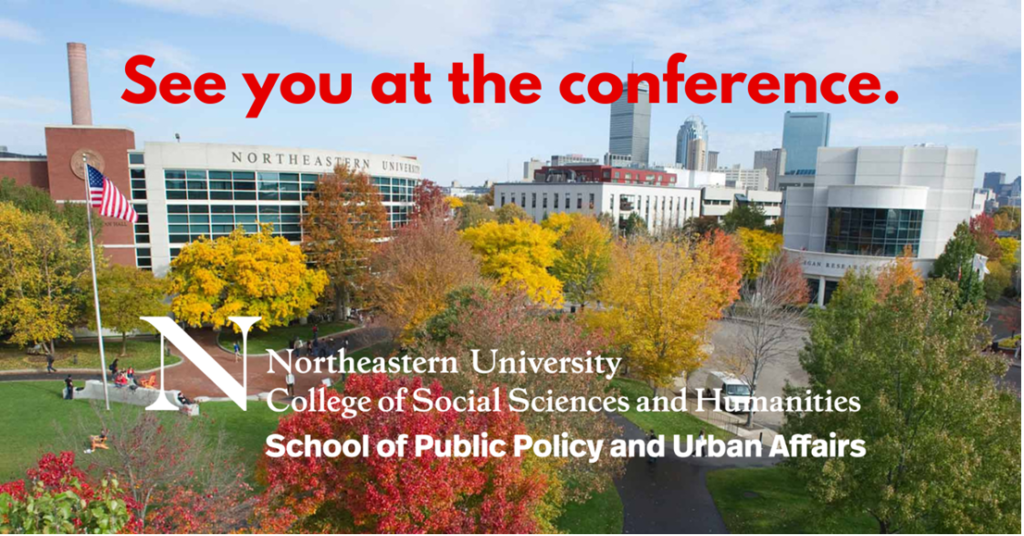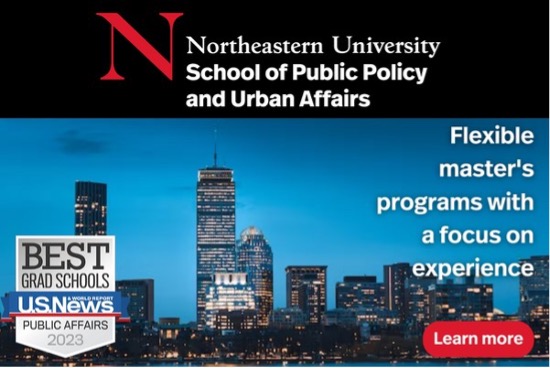
Our professors and thought leaders are excited to engage with you at this year’s Urban Affairs Association Conference. We’re looking forward to connecting with you!
Northeastern panelists in attendance:
(In order from left to right) Josh Lown, Lily Song, Cara Michell, Vivek Mishra, Forrest Hangen, Gavin Shatkin, Tracy Corley, Lizzie Yarina, Liza Weinstein, Mario Hernandez, Joan Fitzgerald, Yanli Liu, Serena Alexander, and A.R. Shariq Mohammed.

Where we’ll be at UAA:
Landlords and Tenant Exploitation: Examining the Role of Portfolio Size, Ownership Structure and Business Models in the US Rental Market
Thursday, April 25, 9:50– 11:20 am, in Room ODETS (4th Floor) with Forrest Hangen
The increasing prominence of institutional investors, large corporate landlords, and new amateur investors in rental markets has generated widespread concerns about the role of aggressive property owners in housing systems. However, these shifts also prompt new debates: what aspects of property owners and landlords are most associated with tenant exploitation, predation, and negative community-level outcomes? And what policy could address the role of these different factors?
Planning Equitable Cities: Urban Design, Land Use, Public Space, Growth Management, Services
Thursday, April 25, 11:30 am – 12:15 pm, in Room GOTHAM (7th Floor) with Joan Fitzgerald, Cara Michell, and Gavin Shatkin.
This roundtable invites scholars who have an interest in reconstructing the planning pantheon to join us for a discussion of what an alternative, ‘people’s canon’ of planning might look like. We start from the premise that a planning canon that elevates the perspectives of a dominant minority cannot provide planners with the knowledge needed to address the complex societal challenges and global environmental issues of today.
Race and Unidentifiable Profile Photos on Digital Platforms: Evidence from Airbnb
Thursday, April 25, 3:00– 4:30 pm, in Room BROADHURST (5th Floor) with A.R. Shariq Mohammed and Yanli Liu
This study delves into racial dynamics on digital platforms, specifically Airbnb, investigating users’ strategic choices in displaying racial identity through profile photos. Employing a unique approach with a panel of host photos, our research addresses three main questions. First, we explore whether users strategically choose to display profile photos with race-dependent patterns. Second, we assess the bias in racial gap estimates when considering both identifiable and unidentifiable profile photos. Third, we examine whether the tendency to use unidentifiable photos correlates with property or host attributes and market characteristics.
Urban Economic and Social Exclusion by Race, Ethnicity, Gender, Identity, Age Community Innovation Lab
Friday, April 26, 8:00 – 9:30 am, in Room BROADHURST (5th Floor) with Mario Hernandez
This talk will provide a description and overview of a new Community Innovation Lab (CIL) that Dr. Shellae Versey (Fordham University) and Mario Hernandez (Northeastern University) are co-developing. The Lab will serve as a central resource for academics, activists and policy makers working to counteract the harmful effects of gentrification, and the unintended consequences that often accompany it – displacement, socioemotional distress, rising food and housing costs. Given the rapid pace of gentrification and displacement in cities around the world, CIL will serve as a collective hub and incubator lab for innovative ideas and creative solutions for preserving and improving communities facing the threat of displacement and other harmful consequences of gentrification.
Environmental and Energy Policy Challenges in Cities and Urban Green Futures
Friday, April 26, 8:00 – 9:30 am, in Room HERALD (7th Floor) with Serena Alexander
Highway capacity expansion has wide impacts on land use and land cover (LULC). Cost-benefit analyses and environmental review processes for roadway capacity expansion and maintenance decisions do not comprehensively consider the LULC impacts. The research questions examined by this study are: 1) How can highway capacity expansions impact land cover change and vegetation health in the surrounding environment; and 2) What is the relationship between land use and the vegetation impacts of highway projects?
Reparative Arts for Community Preservation in Boston Chinatown
Friday, April 26, 9:50 – 11:20 am, in Room BOOTH (5th Floor) with Lily Song
This paper explores the role of arts and culture in collective acts of reimagining and rebuilding from the racial harms and spatial injustices of urban planning and redevelopment in the context of Boston Chinatown. Since being settled by Chinese workers in the late 1800s, Chinatown has persevered as a vital residential neighborhood, commercial district, and cultural hub. Community members have endured rounds of racial segregation and violence, highway displacement, urban renewal, institutional encroachment by a growing medical-educational complex, and exclusionary high-end real estate development. In turn, generations of Chinatown residents, activists and leaders have mobilized to push back against top-down planning, external control of land uses, and speculative profit-driven development as well as advance community building and planning for the preservation and well-being of Chinatown as an immigrant and working-class neighborhood.
The Real Estate Turn in the Slum: The local state as facilitator of in-situ redevelopment in Delhi and Mumbai
Friday, April 26, 9:50– 11:20 am, in Room ODETS (4th Floor) with Liza Weinstein and Vivek Kumar Mishra
Contributing to insights on the “real estate turn,” specifically the growing reliance of local governments on property development to finance local initiatives and shape spatial politics, this paper compares long standing efforts underway in the Indian cities of Mumbai and Delhi to monetize slum lands by rehousing residents and developing high-end properties that maximize real estate profits. While the extant has attributed successful land monetization to centralized state control, our findings suggest that these efforts have been less effective in Delhi, despite the local state’s more extensive land holdings and greater autonomy over land management. Somewhat counterintuitively, we attribute Mumbai’s more successful promotion of the real estate turn in these spaces to its more diffuse control of both land and people, which has required that its development agencies facilitate, rather than control slum redevelopment efforts.
Transformative Science for Transitioning Cities: A Systematic Review of Participatory Neighborhood Development Research
Friday, April 26, 9:50– 11:20 am, in Room O’NEILL (4th Floor) with Tracy A. Corley
Philosophers of science have classified approaches to scientific inquiry into three branches: positivist and post-positivist studies that focus on the methods used to determine causal relationships, realist/pragmatic inquiries that focus on a study’s application to real-world problems, or hermeneutic (also known as constructivist) examinations that seek to understand the values of individuals and groups. These scientific paradigms rest on assumptions and philosophical frameworks that, in the social sciences, can reveal the nuances of complex, multifaceted urban phenomena like institutions and urbanization. However, each paradigm’s theoretical, analytical, and methodological orientation is insufficient to explain the swelling number of research activities that pursue equitable and meaningful public participation in the scientific process.
Model City: Shifting Landscapes of Flood Risk in Can Tho, Vietnam
Friday, April 26, 11:30 am – 1:00 pm, in Room SOHO (7th Floor) with Lizzie Yarina
Technical representations of the world have the power to shape what is seen and what is valued. Hydraulic and hydrological models serve as engines, reshaping social and hydrological conditions, though not necessarily in their image. Yet, while water models and other tools for simulating reality have become more advanced, urbanizing Southeast Asian cities have arguably become more unstable, and more resistant to being modeled. Can Tho city, at the heart of Vietnam’s low-lying Mekong Delta, is in a constant state of adaptation not only to environmental risks and globalization, but also to development itself.
Language as a Weapon: Claiming the ‘right to the city’ Through the Use of Language for Hispanic Residents in a Gentrifying Neighborhood
Friday, April 26, 11:30 am – 1:00 pm, in Room HUDSON (7th Floor) with Josh Lown
Critical geographers since Henri Lefebvre have described the process in which social relations, expressions of power, and the feelings of alienation involved in regulating the accessibility and function of public space as being the process in which residents claim a ‘right to the city’. In gentrifying communities, the act of laying claim to a space transcends the theoretical – claiming a ‘right to the city’ is an act of claiming a right to belong against the alienation of gentrification.
How Useful Are Opinion Polls in Designing Urban Environmental Policies? Evidence from Indian Cities
Friday, April 26, 3:30– 5:00 pm, in Room HERALD (7th Floor) with A.R. Shariq Mohammed
With the rapid growth of cities, developing nations like India are confronted with extensive environmental hurdles. These challenges manifest as strains on civic infrastructure, overcrowding, urban sprawl, deteriorating air and water quality, mismanaged waste, and socioeconomic inequality. Despite this concerning reality, it is alarming that urban residents are largely unaware of climate change, and they hold the belief that there is no need for the government to do more to address challenges related to climate change. This article explores the inconsistency between the reality and urban residents’ perception by studying the Government of India’s initiative to rank 111 cities based on two criteria: (i) an objective evaluation of cities’ performance, and (ii) an opinion poll of urban residents. Sustainable urban development constituted one of the three key pillars of both the approaches.

[2024 ICUA – advertisement]



